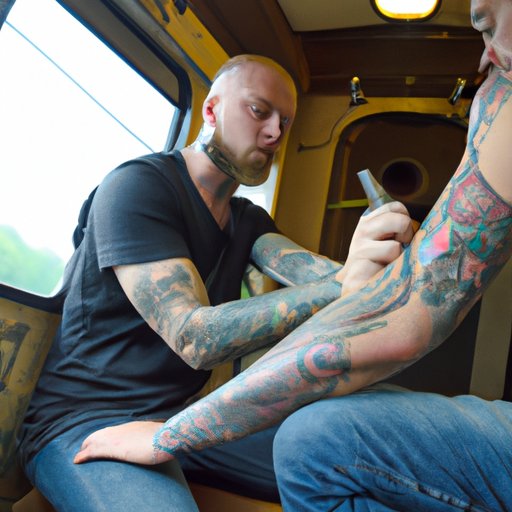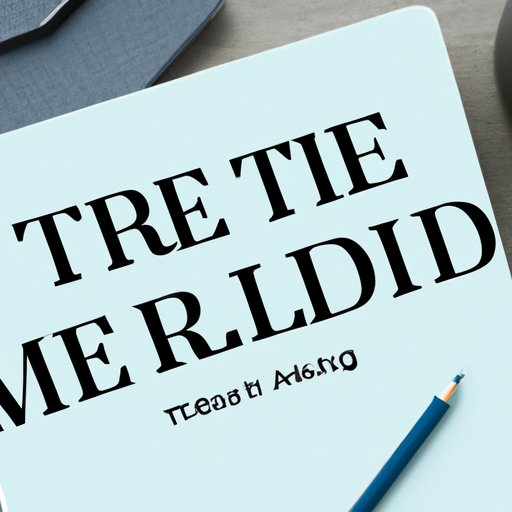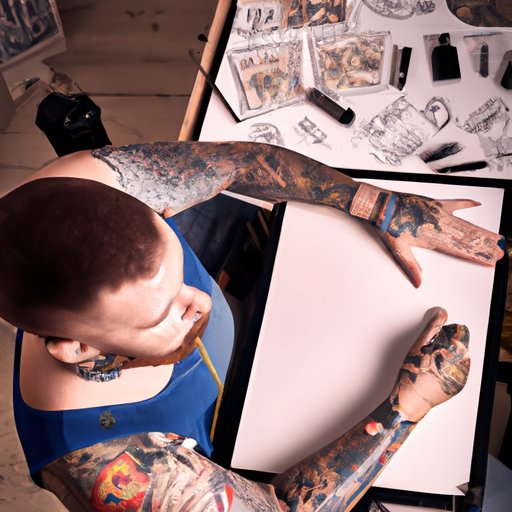Introduction
Tattooing is one of the oldest art forms in existence. Today, tattoos are more popular than ever, with millions of people getting inked each year. If you’re interested in becoming a tattoo artist, you’ll need to understand the industry and its regulations, obtain the right certifications and licenses, and train with an experienced artist. With the right knowledge and skills, you can become a successful tattoo artist and make a living doing something you love.
Overview of the Tattoo Industry
The global tattoo industry is estimated to be worth over $50 billion. In the United States alone, it’s estimated that 40% of adults have at least one tattoo, and 20% have multiple tattoos. According to the Pew Research Center, 36% of millennials have at least one tattoo. This growth in popularity has created a surge in demand for talented and skilled tattoo artists.
The benefits of becoming a tattoo artist include the potential to earn a good income, the opportunity to express yourself creatively, and the satisfaction of helping people look and feel their best. However, it’s important to remember that being a tattoo artist isn’t just about drawing; it also requires a deep understanding of the industry and the commitment to follow all health and safety regulations.
Research the Tattoo Industry
Before you begin your journey to becoming a tattoo artist, it’s important to do your research and learn as much as you can about the industry. Start by familiarizing yourself with state regulations for tattooing, as these may vary depending on where you live. For example, some states require that all tattoo artists be licensed, while others may not have any regulations in place.
You should also understand the different types of tattoos and art styles. From traditional Americana tattoos to Japanese-style designs and even abstract pieces, there are many different ways to express your creativity. It’s also important to familiarize yourself with the health and safety requirements for tattooing, such as sterilization techniques and proper disposal of needles and other materials.

Obtain Necessary Licensing and Certifications
Depending on your state or country, you may need to obtain a license or certification in order to legally practice as a tattoo artist. The most common type of license is the Body Art Practitioner License, which is typically required in most states. You may also need to complete additional courses or exams, such as bloodborne pathogen training, first aid and CPR training, and/or an apprenticeship program.
Once you’ve determined what licenses and certifications you need, you’ll need to take the necessary classes and exams. These can usually be completed online or at a local trade school. Once you’ve completed the required courses, you’ll need to submit an application to your local department of health. After review and approval, you’ll be issued a license or certification to practice as a tattoo artist.

Train with an Experienced Tattoo Artist
Once you’ve obtained the necessary licenses and certifications, it’s time to start training with an experienced tattoo artist. This is key to becoming a successful tattoo artist, as it will give you hands-on experience and allow you to learn from someone who knows the ins and outs of the industry. When looking for a mentor or apprenticeship, try to find someone who specializes in the type of tattoos you want to create.
When you’re training with an experienced artist, it’s important to learn about the different types of tattoo equipment and supplies. You’ll need to understand the basics of tattoo machines, needles, inks, and stencils, as well as how to properly care for and store them. Additionally, you’ll need to practice on both human skin and synthetic material to get a feel for the process and hone your technique.
Develop Your Artistic Skills
As a tattoo artist, it’s essential that you have strong artistic skills. To develop your talent, explore different art forms and techniques, such as painting, drawing, sculpting, and photography. Experiment with different mediums, such as charcoal, pastels, acrylics, and watercolors. And practice drawing tattoo designs, such as flowers, animals, skulls, and lettering.
It’s also important to stay up to date on trends and techniques. Read relevant publications, attend tattoo conventions, and network with other professionals. Having a good understanding of the industry and staying current on new developments will help you stay ahead of the competition.
Purchase or Build a Home Tattoo Studio
If you plan to work as a freelance tattoo artist, you’ll need to invest in quality equipment and supplies and set up a home studio. Choose a location that is easily accessible to clients, and make sure to follow all laws and regulations regarding home studios. You’ll also need to ensure that your studio meets all health and safety requirements.
Market Your Services
Once your studio is set up and you’re ready to start taking clients, it’s time to market your services. Create a professional website that showcases your work and includes contact information. Advertise on social media platforms, such as Instagram and Facebook, and participate in local events. These are all great ways to get your name out there and build a client base.

Stay Up to Date on Trends and Techniques
Finally, it’s important to stay up to date on trends and techniques. Read relevant publications, attend tattoo conventions, and network with other professionals. Having a good understanding of the industry and staying current on new developments will help you stay ahead of the competition.
Conclusion
Becoming a professional tattoo artist requires dedication, hard work, and a passion for art. You’ll need to understand the industry and its regulations, obtain the right certifications and licenses, and train with an experienced artist. Once you have the necessary skills, you can purchase or build a home studio, market your services, and stay up to date on trends and techniques. With the right knowledge and commitment, you can become a successful tattoo artist and make a living doing something you love.
(Note: Is this article not meeting your expectations? Do you have knowledge or insights to share? Unlock new opportunities and expand your reach by joining our authors team. Click Registration to join us and share your expertise with our readers.)
